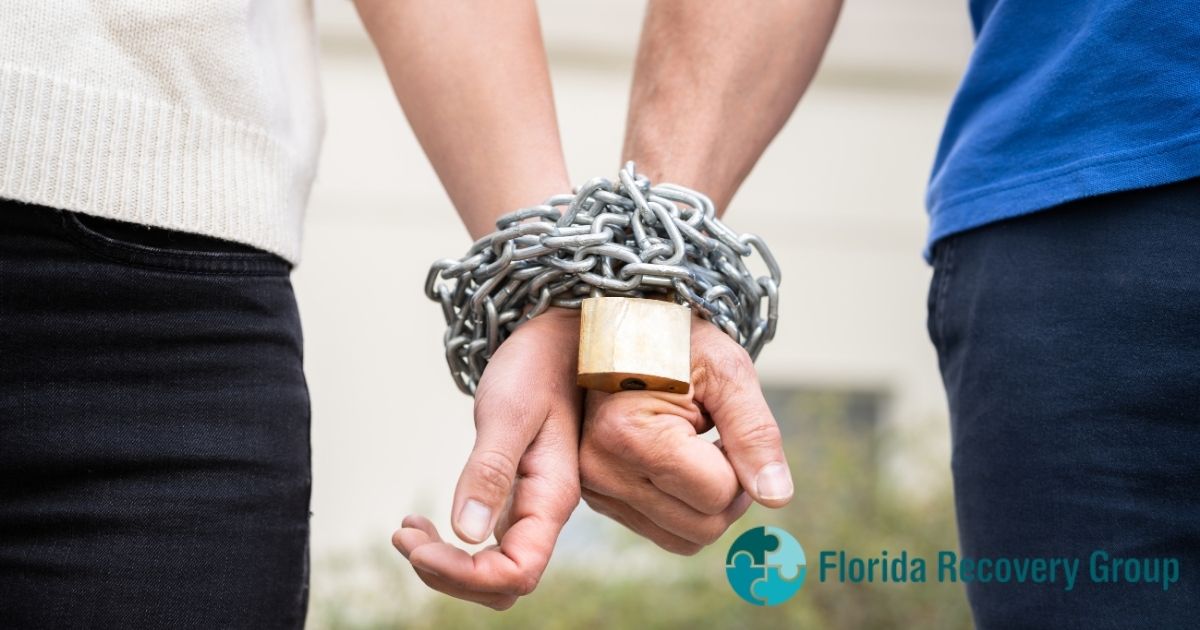
17 Oct What is the Difference Between Interdependence and Codependence?
Relationships are difficult to navigate, whether they are with a family member, friend, or romantic partner. If you aren’t careful, sometimes your relationships can become toxic. One of the signs of a toxic relationship is codependency.
Codependency occurs when one person depends on the other to the point that it is harmful to both people involved. Research has found that nearly 40 million Americans can be described as codependent, with depression being strongly related to codependent behaviors.[1] This is not to be confused with interdependence, which is a term used to describe a relationship that involves sharing roles and benefiting from one another.
Being aware of the differences between interdependence and codependency can help you determine whether you need to make some positive changes in your relationships.
The Difference Between Interdependence and Codependency
Interdependency is a sign of a healthy relationship. When you are in an interdependent relationship that means that both people are contributing equally and benefiting one another. For example, interdependent partners recognize that they are separate people from one another, pick up the slack for each other, and ask each other for help when it is needed.
In interdependent relationships, both partners:
- Take care of themselves while having a healthy relationship with one another
- Depend on one another without being unhealthy or damaging to the other partner
Codependency is a term used to describe an unhealthy relationship where one partner relies on the other to take care of them. The caretaker in the relationship will put their partner’s needs before them, neglecting themselves in the process. This can be extremely unhealthy for both individuals, making the relationship unbalanced.
In codependent relationships, it is common for one partner to:
- Has an excessive need to be taken care of by the other
- Puts the needs of the other ahead of their own
- Constantly worry about the other and makes decisions based on how it will affect them
- Feel like they do not matter without the other person in their life
Why is Codependency Harmful?
The main danger of being in a codependent relationship is enabling the person who is relying on the person in the caretaker role. This is why it is common to see people in codependent relationships struggling with addiction, alcoholism, or other types of negative behavioral conditions.
Some of the common harmful behaviors that take place during codependent relationships include:
- Rescuing your partner from legal or financial trouble
- Constantly cleaning up after them and pulling more of the weight around the house
- Helping them hide their addiction or alcoholism from friends and family
- Lying to cover for them when they get in trouble
- Protecting them from the consequences of their own actions and enabling them to continue their behavior
- Adopting responsibilities for them
- Allowing your own needs to go uncared for
Oftentimes, the person in the caretaker role develops low-self esteem and begins to neglect their own needs. Additionally, they might begin to believe their partner’s emotions are their responsibility. If their partner is upset, so are they and they might even believe it’s their fault.
Signs You Are in a Codependent Relationship
Codependency can be difficult to identify, especially if you are dealing with it in your own relationship. Oftentimes, it’s easier to spot codependency from the outside.
The signs of codependency in a relationship include:
- Taking responsibility for your partner’s actions
- Blaming yourself for all of the problems in your relationship
- Having a hard time maintaining healthy boundaries
- Compulsively taking care of others
- Experiencing feelings of worthlessness
- Feeling the need to be liked by everyone
- Constantly seeking a relationship and feeling incomplete when you are not romantically involved with someone
- Having an intense fear of abandonment
- Attempting to control or manipulate others
- Sacrificing your own happiness to cater to those around you
- Poor sense of self outside of relationships
- Being unable to express your needs or desires to have them met
- Feelings of guilt and shame
- Being obsessed with changing the feelings or behaviors of other people
Because codependency can be damaging for both people in a relationship, the best way to recover is to seek couples counseling. Couples counseling can help you and your partner change negative patterns of behavior into positive ones, improving your relationship overall. You should seek individual therapy as well to recover from codependent behaviors you might engage in on your own.
During codependency treatment, you will learn how to take care of your own needs, stop enabling your partner, and see yourself as a separate person outside of your relationships. This will help you learn how to come together healthily, encouraging an interdependent relationship rather than a codependent one.
Find Help for Codependency
If you or a loved one struggles with codependency, professional treatment can help. Evidence-based therapies can teach you how to set healthy boundaries, care for your own needs first, and stop enabling people around you.
At Florida Recovery Group, we offer comprehensive mental health treatment that can help individuals establish and maintain healthy relationships. Contact us today to learn more.
References:
- The National Library of Medicine (NLM): Depression and codependency in women, Retrieved October 2023 From https://pubmed.ncbi.nlm.nih.gov/9868824/





